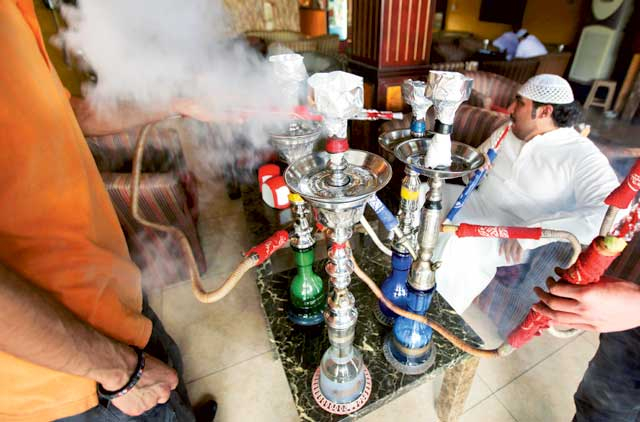Manama: Saudi Arabia’s Commission for the Promotion of Virtue and Prevention of Vice is seeking to impose a ban on smoking shisha at the Corniche of the Red Sea city of Jeddah.
The 30km coastal resort area is among the top attractions of the city with its recreation spaces, restaurants, playgrounds, pavilion, sculptures and King Fahad's Fountain, the highest fountain in the world.
However, the commission said in a report that its members have noticed a growing number of men and women, and more alarmingly of young people, smoke shisha in the area, resulting in “the pollution of the fresh air sought after by residents and visitors.”
The commission argued that causing pollution in the area violated the law committing the state to protect the environment Saudi daily Al Eqtisadiya reported.
The commission also referred to the ban by the interior minister on smoking shishas inside restaurants, cafés and public places.
According to official figures, Saudi Arabia is home to six million smokers, including 600,000 women and around 800,000 teenagers, mainly intermediate and high school students.
However, expatriates also account for a significant proportion of cigarette consumption in the kingdom despite the increase in the number of awareness campaigns about health risks related to smoking and passive smoking and the adoption of several legislative restrictions.
Scores of women have decided to take action in their own way by adding divorce to the risks and dangers associated with smoking.
According to a data report published in the kingdom in 2013, more than 100 women in the Western city of Madinah have filed for divorce after their husbands refused or were unable to quit smoking.
“Courts in other cities in Saudi Arabia have also accepted cases filed by unhappy wives who wanted a divorce over the issue of smoking,” Saudi daily Okaz said. “Attempts by reconciliation committees to keep the spouses have failed to convince the wives who insisted on smoke-free husbands. The issue is now being addressed before the wedding and several young women in Madinah have rejected marriage proposals from men who smoked,” the daily said.
The report was prepared based on studies and research on the effects of smoking on marital relations.
The daily said that around 40 per cent of Saudi university graduates flatly rejected to marry husbands who smoked.
The young women attributed their uncompromising decision not to “marry themselves into a smoking home” to health concerns about themselves, their future husbands and their future children.
A Saudi judge has ruled that women who suffered as a result of their husbands’ smoking were allowed to file for divorce.
In October 2012, Saudi judges set a new trend in the country by using cigarette smoking as a factor in child custody cases.
“A parent could now lose the custody case if he or she is proven to be a smoker,” a legal official said.
“Under the emerging trend, the smoking factor is now being treated like the drinking factor and can decide the outcome of the custody case,” he said.
The court would favour non-smoking parents and would factor smoking into custody cases to protect the child from the negative impact of passive smoking.











